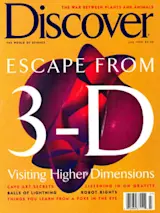Robert Charlson glances at a stand of dark pines a few hundred yards away, across the flat gray waters of Lake Washington. This air looks pretty clean,’’ he says.
It sure does. A cold scent of fresh water is blowing off the lake behind the parking lot of the National Oceanic and Atmospheric Administration’s Pacific Marine Environmental Laboratory in Seattle. Sparrows are cheeping all around as they flit among the red and gold leaves of trees in full autumn display. There’s a constant scritch-scritch sound coming from the lawn, where a flock of Canada geese, each approximately the size of a well-fed third grader, is munching grass. The sensible compacts in the parking lot aren’t belching exhaust, and even the smoke coming from one of NOAA’s boxy white buildings looks like harmless water vapor. It’s hard to imagine how the atmosphere could be any cleaner and still have any modern, ...














